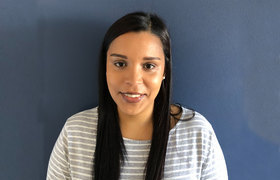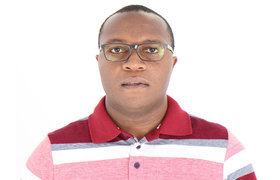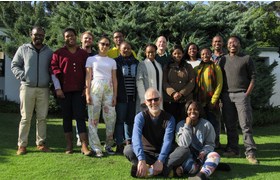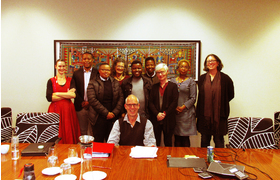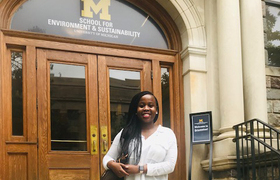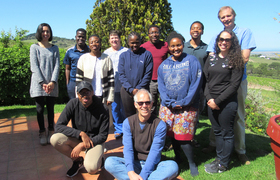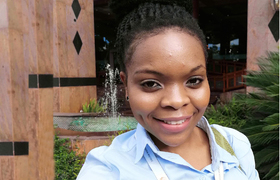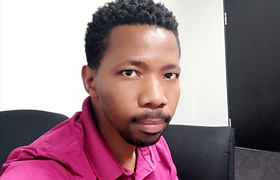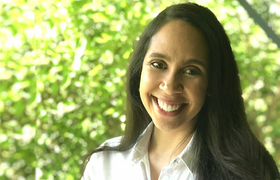Dylan Valley: New nGAP member
29 April 2020 | Story Dylan Valley. Photo Supplied. Read time 3 min.
Dylan Valley joined the Centre for Film and Media Studies at the University of Cape Town (UCT) as an nGAP lecturer this year. He is an award-winning documentary filmmaker and a media scholar who views film as a liberatory tool. As an emotive medium, film can be used to move an urgent conversation forward or to correct widely held misperceptions. Valley has done work on revisiting the history of Afrikaans, reframing it as a creole language (Afrikaaps) and has documented urgent responses to police brutality (The Uprising of Hangberg).
Prior to coming to UCT, Valley worked in the Film and Television Department at the Wits School of Arts at the University of the Witwatersrand (Wits), where he is registered as a PhD student in media studies at the School of Literature, Language and Media. He is supervised in media studies by Dr Dee Marco. As an academic, he has published in Safundi as well as the interactive online journal Ellipses.
Valley’s PhD research explores how the internet is shaping new forms of film-making on the African continent and in the diaspora, with a particular focus on the ways in which black women are engaging in web series creation as a means to overcome inequities in film and television.
In 2013 Dylan received a Pulitzer fellowship from the University of Southern California (USC) in Los Angeles, where he received his master’s in specialised journalism. At USC he completed his thesis documentary on the groundbreaking web series The Misadventures of Awkward Black Girl. In January 2020, his virtual reality documentary Azibuye – The Occupation premiered at the Sundance Film Festival. Sundance, founded by Robert Redford in 1978, is one of the biggest film festivals in the world and is attended not only by film-makers, but also thought leaders from all continents.
Azibuye – The Occupation was part of the festival’s New Frontiers selection, which showcases projects that use emerging technologies in film and digital storytelling. These are virtual reality, augmented reality and what is now being called extended reality or XR. Azibuye is Valley’s first virtual reality project, and he is planning to do more work in this field, both in research and practice.
Past work
Regarding past work, Valley has directed various documentaries for South African and international television, namely the award-winning Afrikaaps (2010), The Uprising of Hangberg (2010), Jumu’a: The Gathering (2011) and Incarcerated Knowledge (2013). He has also directed two documentary films for the Al Jazeera Documentary Channel (via Hotspot Films, Cairo).
Valley spent a year as a commissioning editor at the South African Broadcasting Corporation. He is on the editorial board of the critical Pan-African arts, politics and culture blog, Africa is a Country. In his spare time, he collects vinyls and sometimes plays them to an audience. He is looking forward to DJ’ing at the next nGAP party.
 This work is licensed under a Creative Commons Attribution-NoDerivatives 4.0 International License.
This work is licensed under a Creative Commons Attribution-NoDerivatives 4.0 International License.
Please view the republishing articles page for more information.
New Generation of Academics Programme (nGAP)
UCT has responded energetically to the New Generation of Academics Programme (nGAP), an opportunity provided by the Department of Higher Education (DHET) to build a new generation of black South African academics. The DHET’s 2015 vision document, “Staffing South Africa’s Universities Framework: A comprehensive, transformative approach to developing future generations of academics and building staff capacity”, proposes a suite of initiatives to address the challenge, with nGAP being the major instrument to increase the numbers of black South African academics.
The programme “involves the recruitment of highly capable scholars as new academics, against carefully designed and balanced equity considerations and in light of the disciplinary areas of greatest need”. The nGAP scholars are appointed into permanent positions where from the outset their conditions are customised to ensure their successful induction into the ranks of established academics.
The DHET provides funding over a six-year period to support the appointment of an nGAP lecturer, and their time is protected to provide the best possible opportunity for the completion of a doctorate degree in the shortest possible time. Once the degree is completed, the nGAP lecturer’s teaching commitments are steadily increased until they shoulder a full teaching load.
Since the first advertisement for nGAP posts in 2015, UCT has been awarded 17 nGAP positions: 5 (Phase 1), 4 (Phase 2), 3 (Phase 3) and 5 (Phase 4). These are distributed across all faculties.
UCT’s nGAP scholars operate as a single cohort, managed and coordinated by Dr Robert Morrell. Lecturers meet for quarterly meetings, writing retreats and various capacity-building activities all designed to support the completion of postgraduate qualifications (particularly doctorates) and to develop records of achievement that will testify to their emergence as self-standing, excellent academics. Each lecturer is mentored by a senior scholar, who provides support and guidance on the challenges that routinely face academics.
The nGAP manager sets great store in building the cohesion of the cohort and encouraging the establishment of new UCT networks while producing a collaborative, mutually supportive and embracing work culture.
According to Dr Morrell, “This group of academics will lead UCT in 15 to 20 years’ time ... Their vision of excellence, of being African and South African, of serving a wider community and producing knowledge for the planet, the continent and the country, will power UCT in years to come.”
Newsletters
In the news
